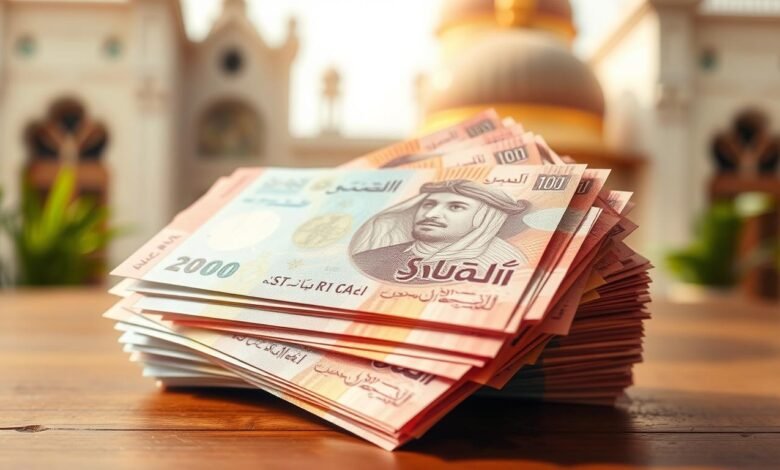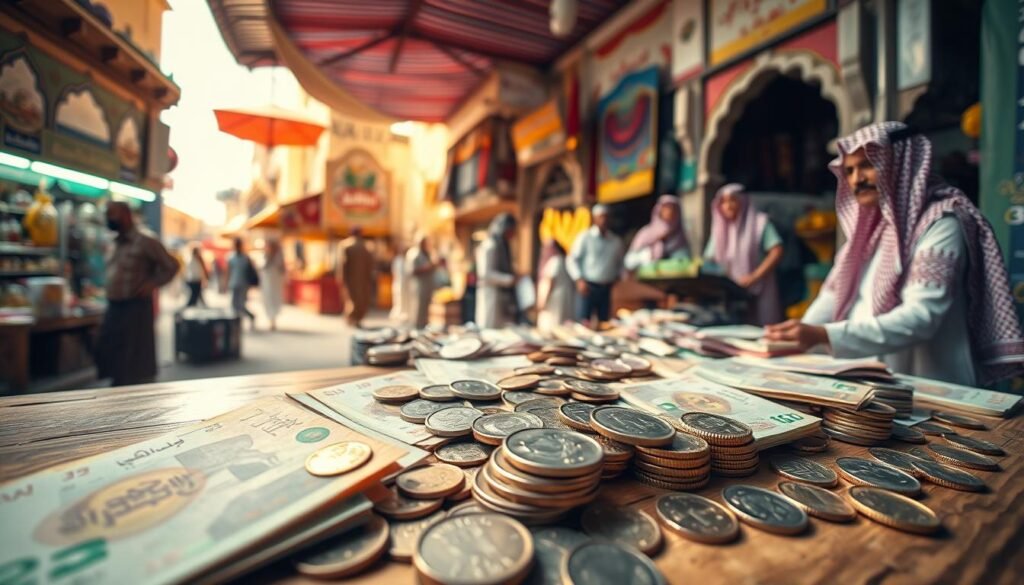Currency and Payment Tips: Handling Money in Saudi Arabia

Did you know that learning about money in Saudi Arabia can be exciting? It’s a journey into the country’s rich financial world. Knowing about the local currency and how to pay can make your trip better. Are you ready to explore the financial side of the Arabian Peninsula?
In this guide, we’ll explore the Saudi riyal, the country’s official currency. You’ll learn about its history and what keeps its value stable. Whether for work or fun, knowing how to handle money and make digital payments will help you in Saudi Arabia.
Understanding the Saudi Riyal: Official Currency Overview
When you visit Saudi Arabia, knowing the Saudi riyal (SAR) is key. The riyal has a rich history, playing a crucial role in the country’s economy.
Current Exchange Rates and Denominations
The Saudi riyal’s value changes with global markets. It’s usually around 3.75 riyals for every US dollar. You can find the riyal in these amounts:
- Banknotes: 5, 10, 20, 50, 100, and 500 riyals
- Coins: 1, 5, 10, 25, and 50 halalas (100 halalas = 1 riyal)
Historical Background of Saudi Currency
The riyal started in the 1930s, replacing old coins in the Arabian Peninsula. It has evolved, with new security features and designs. These changes help with money exchange and financial rules.
Currency Stability and Economic Factors
The riyal is stable thanks to Saudi Arabia’s smart money policies and oil wealth. The Saudi Arabian Monetary Authority (SAMA) keeps an eye on the riyal’s value. This makes the riyal a trusted currency for money exchange and transactions.
| Denomination | Value (in SAR) |
|---|---|
| 500 Riyals | 133.33 USD |
| 100 Riyals | 26.67 USD |
| 50 Riyals | 13.33 USD |
| 20 Riyals | 5.33 USD |
| 10 Riyals | 2.67 USD |
| 5 Riyals | 1.33 USD |
Cash vs. Digital Payments in Saudi Arabia
In Saudi Arabia, how we pay for things is changing fast. Cash used to be the main way to pay, but now digital payments are becoming more popular. This change is affecting how people in Saudi Arabia and visitors handle their money.
Cash is still common in Saudi Arabia. Many businesses and vendors use cash every day. This is because cash is widely accepted and fits with the local culture. But, more people are starting to use digital wallets and mobile payment solutions.
The Saudi government wants to make the country less reliant on cash. With more people using technology, digital payments are becoming more popular. Services like Apple Pay, Google Pay, and local e-wallets are making it easier to pay without cash.
Using digital payments has many advantages. It makes transactions faster and safer. It also helps with tracking money and making payments across borders. As Saudi Arabia keeps up with new technology, using digital wallets and mobile payment solutions will likely become even more common.
Knowing about the changes in Saudi Arabia’s payment methods is important. It helps locals and visitors deal with money easily and confidently. As the country moves towards a more digital future, the mix of cash and digital payments will keep changing the economy.
Essential Money Exchange Tips for Visitors
Exchanging money in Saudi Arabia can be easy with the right tips. Knowing where to exchange money, what documents you need, and the best times to do it is key. This will help you convert your money to Saudi riyals smoothly.
Recommended Exchange Locations
The best places to exchange money are at authorized kiosks and bureaus. You can find them in major airports, hotels, and shopping malls. These spots offer good rates and a safe place to exchange your money.
Documentation Requirements
- A valid passport is the main ID needed for exchanging currency in Saudi Arabia.
- Some places might ask for a hotel booking or itinerary to check if you’re a visitor.
- Having small amounts of your home currency can make the exchange quicker.
Best Times to Exchange Currency
- The best times to go are early morning or late afternoon. These times are less busy.
- Weekdays, especially Monday to Thursday, are better for good rates and shorter waits.
- Try to avoid exchanging money during holidays or festivals. Demand is high, leading to long lines and changing rates.
Remember these tips for a smooth and affordable money exchange in Saudi Arabia. This will help you enjoy your trip more in this amazing Middle Eastern country.

| Exchange Location | Documentation Required | Best Times to Exchange |
|---|---|---|
| Authorized money exchange kiosks and bureaus in airports, hotels, and shopping malls | Valid passport, sometimes a copy of hotel booking or itinerary | Early morning or late afternoon on weekdays, avoid major holidays and festivals |
Credit Card Usage and Acceptance in Saudi Arabia
As an international visitor to Saudi Arabia, knowing about local credit cards is key for a smooth financial experience. Credit cards are widely accepted, but there are some things to keep in mind.
Visa, Mastercard, and American Express are the most accepted credit card brands in Saudi Arabia. These cards are accepted at many places, from fancy hotels and restaurants to small local shops. But, some places might have extra fees or rules for using credit cards.
- Visa and Mastercard are the most widely accepted credit card brands in Saudi Arabia.
- American Express is also widely accepted, but may have limited acceptance compared to Visa and Mastercard.
- Some merchants may impose additional fees or have restrictions on credit card usage.
Credit cards can be handy for buying things and getting cash from ATMs. But, watch out for foreign transaction fees or dynamic currency conversion charges. Knowing your card’s rules and talking to your bank before you go can save you money.
| Credit Card Brand | Acceptance Level in Saudi Arabia | Potential Fees |
|---|---|---|
| Visa | High | Foreign transaction fees, dynamic currency conversion charges |
| Mastercard | High | Foreign transaction fees, dynamic currency conversion charges |
| American Express | Moderate | Foreign transaction fees, dynamic currency conversion charges |
Understanding Saudi Arabia’s credit card scene helps international visitors plan better. It lets them make smart choices about how to pay during their visit.

Islamic Banking Principles and Local Financial Systems
Saudi Arabia’s financial scene is shaped by Islamic banking, following Shariah law. This system offers both chances and hurdles for those exploring the local financial world.
Shariah-Compliant Banking Services
In Saudi Arabia, Islamic banking sticks to Shariah rules. It avoids interest, speculation, and investments in forbidden areas like alcohol and gambling. Instead, it offers unique financing options.
- Murabaha: A cost-plus-profit deal where the bank buys and sells an asset at a higher price.
- Ijara: A leasing deal where the bank owns an asset and lets the customer use it, with the option to buy later.
- Musharaka: A partnership where the bank and customer share profits and losses in a project.
Key Differences from Traditional Banking
Islamic banking differs from traditional banking in its core principles. Islamic banks focus on risk-sharing and profit-sharing, unlike traditional banks that charge interest. This means Islamic banks are involved in the transactions and share the risks and rewards with customers.
| Islamic Banking | Traditional Banking |
|---|---|
| Shariah-compliant products and services | Interest-based lending and investments |
| Risk-sharing and profit-and-loss sharing | Lender-borrower relationship with interest charges |
| Prohibitions on speculation, gambling, and unethical industries | No restrictions on investment sectors |
It’s key for visitors and investors to grasp Islamic banking and local financial rules in Saudi Arabia. Knowing these unique aspects helps them make smart choices and work well within the kingdom’s financial scene.
Money Transfer Services and International Transactions
International money transfers and foreign exchange can seem hard, especially in Saudi Arabia. But, with the right info, you can make safe and quick transactions. We’ll look at the money transfer services in the Kingdom and what to consider for international money moves.
Exploring Money Transfer Options
Saudi Arabia has many money transfer services for both locals and visitors. Some popular ones are:
- Banks: Many local and international banks offer money transfer services, often with competitive rates and convenient branch locations.
- Money Transfer Agencies: Companies like Western Union and MoneyGram have a strong presence in Saudi Arabia, providing quick and reliable money transfer services.
- Online Platforms: Digital money transfer platforms like Remitly and TransferWise have gained popularity, offering user-friendly interfaces and competitive exchange rates.
Factors to Consider
When you’re doing international money transfers in Saudi Arabia, keep these things in mind:
- Fees and Charges: Look closely at the fees for each service, as they can change a lot and affect your transaction cost.
- Exchange Rates: Check the exchange rates from different providers to get the best deal for your money, whether sending or receiving.
- Regulations and Compliance: Saudi Arabia has rules for international money moves, so make sure you follow all needed documents and reports.
Knowing about money transfer options and important factors helps you move money in Saudi Arabia with confidence. This way, your international transactions will be safe and smooth.
Currency and Payment Tips: Handling Money in Saudi Arabia
Safety Measures for Cash Handling
Traveling in Saudi Arabia means being careful with cash. Cash is key in the country, so keeping your money safe is vital. Carry your cash and valuables in a money belt or hidden pocket. Don’t show off big amounts of money in public to avoid theft.
For currency exchange, use trusted places like exchange bureaus or banks. Be sure to check the exchange rate and get the right amount. It’s smart to have small bills for daily buys, as big bills might not be accepted everywhere.
Cultural Considerations in Financial Transactions
When dealing with money in Saudi Arabia, remember the local culture. Saudis value personal connections and trust. So, building a good relationship can help when buying things or negotiating prices. Don’t push for low prices too hard, as it might seem rude.
- Greet the person you are interacting with and inquire about their well-being before discussing business.
- Be patient and allow time for the transaction to unfold; rushing may be seen as impolite.
- Use your right hand when handling money, as the left hand is considered unclean in Islamic culture.
Knowing and respecting the cultural rules of money matters in Saudi Arabia makes your trip better.
ATM Locations and Banking Hours
When visiting Saudi Arabia, knowing where to find ATMs and when banks are open is key. The country has many ATMs in big cities and tourist spots. This makes it easy to get Saudi riyals for your expenses.
Banks in Saudi Arabia usually open at 8:30 AM and close at 5:00 PM on weekdays. But, hours can change based on the bank and area. Some banks might have shorter hours or be closed on Fridays, a holy day.
I’ve found ATMs near hotels, malls, and tourist spots work well. They take many international cards, making it simple to get money. Knowing where to find ATMs and banks helps me manage my money easily in Saudi Arabia.
FAQ
What is the official currency of Saudi Arabia?
The official currency of Saudi Arabia is the Saudi riyal (SAR).
What is the current exchange rate between the Saudi riyal and other major currencies?
The Saudi riyal has a stable exchange rate. 1 USD is usually worth about 3.75 SAR. But, the rate can change a bit based on the market.
Can I use cash or digital payments in Saudi Arabia?
Yes, you can use both cash and digital payments in Saudi Arabia. Cash is more common for small purchases. But, credit/debit cards and mobile wallets are also accepted.
Where can I exchange currency in Saudi Arabia?
You can exchange currency at banks, exchange bureaus, and some hotels. Make sure to exchange at trusted places. You’ll need your passport for this.
Are credit cards accepted in Saudi Arabia?
Yes, credit cards like Visa, Mastercard, and American Express are accepted. But, some places might charge extra or have limits. Always check with your bank before traveling.
How does Islamic banking work in Saudi Arabia?
Islamic banking in Saudi Arabia doesn’t allow interest. It focuses on profit-and-loss sharing instead. Many banks offer Shariah-compliant services, like investment and financing options.
What are the options for transferring money to and from Saudi Arabia?
You can transfer money through bank wires, services like Western Union, or online platforms. The best option depends on how fast you need it, how much it costs, and how easy it is to use.
What should I be aware of when handling cash in Saudi Arabia?
Be careful with cash in Saudi Arabia. Don’t show off how much money you have. Use a money belt or hidden pockets for safety. Also, be respectful of local customs when dealing with money.
Where can I find ATMs and what are the banking hours in Saudi Arabia?
ATMs are easy to find in big cities and tourist spots. Banks are open from 8:00 AM to 5:00 PM, Sunday to Thursday. Some places might have longer hours or be open on weekends.




